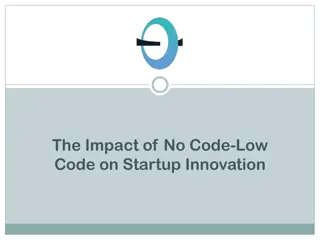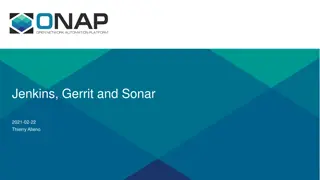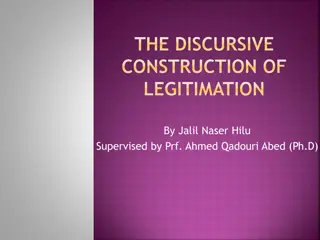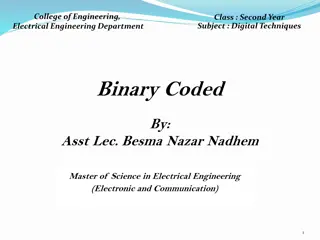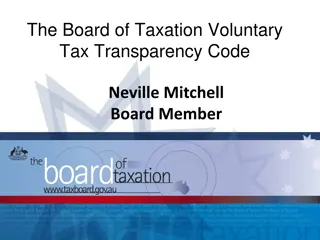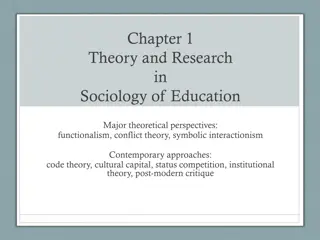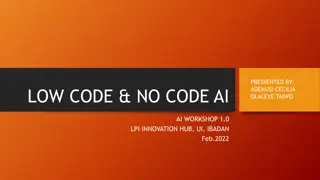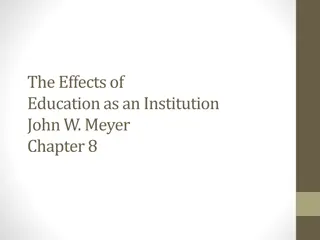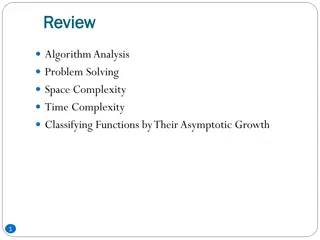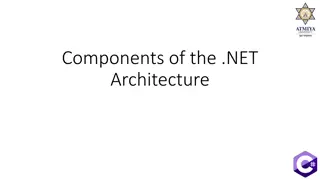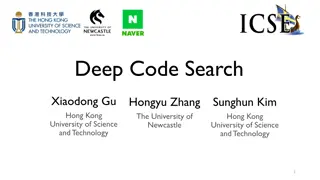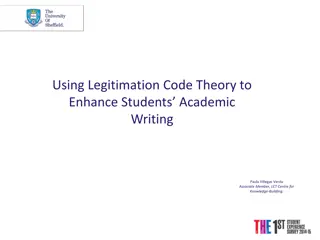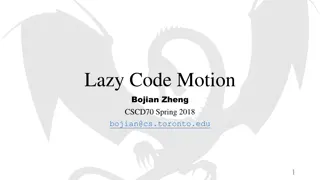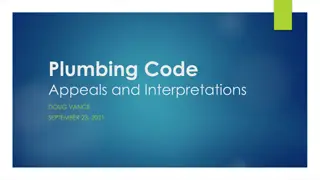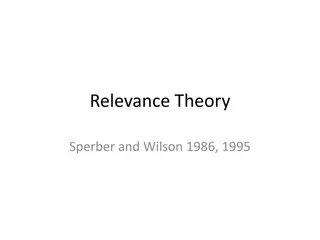Ginzburg Landau phenomenological Theory
The Ginzburg-Landau phenomenological theory explains superconductivity and superfluidity as distinct thermodynamic phases. It focuses on phase transitions characterized by singularities in specific heat at the transition temperature. Derived from BCS theory, it quantifies condensation energy, emphas
1 views • 38 slides
The Impact of No Code-Low Code on Startup Innovation
In the vibrant world of startups, innovation is the cornerstone of success. As these businesses aim to carve out their niches, they often face a common hurdle: the extensive resources required for traditional software development. However, the emergence of low code no code (LCNC) platforms is revolu
2 views • 12 slides
Evolution of Mathematical Theories and Proof Systems
Development of mathematical theories such as model theory, proof theory, set theory, recursion theory, and computational complexity is discussed, starting from historical perspectives with Dedekind and Peano to Godel's theorems, recursion theory's golden age in the 1930s, and advancements in proof t
1 views • 29 slides
Psychological Theories of Criminality: Understanding the Roots
Psychological theories of criminality delve into the association between intelligence, personality, learning, and criminal behavior. Major theories include Psychodynamic Theory by Freud, Behavioral Theory by Bandura, and Cognitive Theory by Kohlberg. These theories explore how unconscious mental pro
1 views • 20 slides
Improving Code Analysis Workflow with Jenkins, Sonar, and Gerrit
Enhance code analysis processes by analyzing source code before merging, enabling analysis in branches, and triggering Jenkins jobs. Sonar.cloud provides options to analyze branches using Maven build, while the proposal suggests using Jenkins plugin for code review. Addressing challenges with Gerrit
1 views • 12 slides
Discursive Construction of Legitimation: Understanding Authority and Ideology
Systems of authority aim to establish legitimacy through discourses. Legitimation involves self-orientation, justification, and the imposition of ideologies. This practice encompasses various principles and categories such as moral evaluation, rationalization, and multimodal approaches, shaping soci
1 views • 36 slides
Understanding the Theory of Firms: Neoclassical vs. Modern Approaches
The theory of firms is explored through the Neoclassical and Modern perspectives. Neoclassical theory focuses on profit maximization, while Modern theory delves into managerial, principal-agent, and transaction cost theories. The discussion covers criticisms of Neoclassical theory and the essential
1 views • 79 slides
Understanding Legitimacy in Family Law
Legitimacy in family law refers to the status acquired by a person born in lawful wedlock, as opposed to illegitimacy where a child is born out of wedlock. Legitimation is the process through which an illegitimate child gains legitimate status. In Nigeria, customary law also recognizes legitimacy ba
0 views • 22 slides
Theories of Causation in Psychological and Social Sciences
Overview of theories of causation categorized into psychological, social psychological, and sociological perspectives. Psychological theories focus on instinctive, biological, and psychological qualities of abusers, including Attachment Theory, Psychodynamic Theory, Social Learning Theory, and Situa
0 views • 15 slides
Understanding Political Theory through a Contextual Approach
Exploring G.H. Sabine's perspective on political theory through a contextual approach, emphasizing the importance of historical context and societal influences. Sabine argues that while political theory evolves with its contemporary politics, it should be analyzed within its specific time and social
0 views • 9 slides
Understanding Binary Coded Decimal (BCD) and Excess-3 Code
Binary Coded Decimal (BCD) is a binary code used to represent decimal numbers, with the popular 8421 BCD code and its conversion process explained. Additionally, Excess-3 Code, another BCD code, is detailed with an example of finding its code for a given decimal number. Different BCD codes like 4221
0 views • 11 slides
A New Complaint Handling Code for the Sector - Webinar Highlights
This webinar discusses the introduction of a new Complaint Handling Code for the sector, aiming to address issues in social housing complaint processes. It covers key points, the background leading to the code's development, the Ombudsman's experience, and the code's aims and framework towards high-
0 views • 14 slides
Evolution of Light Theory: From Wave Theory to Quantum Theory
At the turn of the century, the discovery of the photoelectric effect challenged the wave theory of light, leading to the development of the quantum theory by Max Planck and Albert Einstein. This new theory introduced the concept of discrete energy units known as quanta, bridging the gap between wav
1 views • 62 slides
The Board of Taxation Voluntary Tax Transparency Code Overview
The Board of Taxation developed a voluntary Tax Transparency Code to address community concerns and promote greater tax transparency among large businesses. The Code outlines recommended disclosures for both large and medium businesses, encouraging adoption of higher disclosure standards. Internatio
0 views • 20 slides
Theoretical Perspectives in Sociology of Education
Exploring major theoretical perspectives such as functionalism, conflict theory, and symbolic interactionism along with contemporary approaches like code theory, cultural capital, and status competition. The functionalist theory emphasizes social cohesion and maintaining social order through educati
3 views • 14 slides
Simplifying AI Development with Low-Code and No-Code Platforms
Explore the world of low-code and no-code AI development platforms, empowering experts to create applications with ease. Learn about the benefits, tools, and components of these innovative platforms, and discover popular AI tools for no-code development. Accelerate your digital transformation journe
0 views • 11 slides
Effects of Education as an Institution: Insights from John W. Meyer
Understanding education as an institution through legitimation theory and macro-sociological perspectives. Examining socialization, allocation, and social effects of education on individuals and society. Explores the transformative power of education in creating new roles, knowledge, and societal st
0 views • 9 slides
Understanding Pseudo Code and Flow Charts for Algorithm Analysis
Explore the concepts of pseudo code and flow charts for analyzing algorithms, problem-solving, and understanding space and time complexity. Learn about basic elements of pseudo code, assigning operations, and writing effective pseudo code statements in a clear and structured manner. Discover the imp
0 views • 26 slides
Dp-branes, NS5-branes, U-duality, and M-Theory Overview
Overview of Dp-branes, NS5-branes, and U-duality derived from nonabelian (2,0) theory with Lie 3-algebra. Introduction to M-theory, including M2-branes and M5-branes in the strong coupling limit. Discussion on BLG theory, Lorentzian Lie 3-algebra, and the ABJM theory for M2-branes.
1 views • 32 slides
Personal Data Protection Requirements in the Health Sector: EU Twinning Project Overview
This document provides an overview of the personal data protection requirements in the health sector, specifically focusing on the European Union Twinning Project. It covers topics such as legitimation, principles, implementation, enforcement, code of conduct, and European provisions, including the
0 views • 25 slides
Enhancing Code Status Discussions in End-of-Life Care: A Quality Improvement Project
This project led by Dr. John Rutkowski aims to reduce inappropriate interventions for patients with DNR or Modified Code Status by implementing an improved code status documentation system. Data analysis reveals a need for better documentation practices, and survey responses highlight various challe
0 views • 18 slides
Understanding Time-Independent Perturbation Theory in Quantum Mechanics
Perturbation theory is a powerful tool in solving complex physical and mathematical problems approximately by adjusting solutions from a related problem with known solutions. This theory allows for more accurate approximate solutions by treating the difference as a small perturbation. An example inv
0 views • 19 slides
Ethical Theories: Divine Command vs. Virtue Theory Explained
Divine Command Theory asserts that morality is derived from God's commands, contrasting with Virtue Theory which focuses on developing moral virtues to achieve human flourishing and excellence. Divine Command Theory relies on religious texts, while Virtue Theory emphasizes the cultivation of virtues
0 views • 24 slides
Understanding Fermi Liquid Theory in Interacting Fermion Systems
Fermi liquid theory, also known as Landau-Fermi liquid theory, is a theoretical model that describes the normal state of metals at low temperatures. Introduced by Landau and further developed by Abrikosov and Khalatnikov, this theory explains the similarities and differences between interacting ferm
0 views • 23 slides
Understanding the .NET Architecture Components
The .NET architecture comprises various key components such as the Common Language Specification, Code Manager, Managed Code, Unmanaged Code, and Native Code. These components play crucial roles in the development and execution of applications within the .NET framework. Managed code is executed by t
0 views • 21 slides
Challenges in Code Search: Understanding, Matching, and Retrieval
Programming can be challenging due to the lack of experience and unfamiliar libraries. Code search engines struggle with representing complex tasks, while information retrieval techniques aim to bridge the gap between source code and natural language queries. The mismatch between high-level intent a
0 views • 21 slides
Computational Learning Theory: An Overview
Computational Learning Theory explores inductive learning algorithms that generate hypotheses from training sets, emphasizing the uncertainty of generalization. The theory introduces probabilities to measure correctness and certainty, addressing challenges in learning hidden concepts. Through exampl
0 views • 43 slides
Enhancing Academic Writing with Legitimation Code Theory
Explore how Legitimation Code Theory (LCT) can help identify and explain the expectations for good academic paragraphs. Delve into practical activities and discussions regarding academic writing standards and the use of LCT in guiding student output. Gain insights into the nuances of academic discou
0 views • 25 slides
Automata Theory and Theory of Computation Overview
This course overview covers concepts in automata theory and theory of computation, including formal language classes, grammars, recognizers, theorems in automata theory, decidability, and intractability of computational problems. The Chomsky hierarchy, interplay between computing components, modern-
0 views • 42 slides
Software Quality and Source Code Management Best Practices
Effective source code management is crucial for software quality assurance. This involves locking down code, baselining milestones, managing code variants, and ensuring traceability. Software Configuration Management (SCM) is key, encompassing configuration items and core concepts like creating base
0 views • 34 slides
Challenges Faced by Sustainable Development Goals Due to Organized Crime and Corruption
Organized crime and corruption present significant challenges to achieving sustainable development goals. This includes shifts in illicit markets, expansion of criminal activities, and geopolitical implications. Legalization and legitimation of illicit activities, as well as developmental uses of or
0 views • 14 slides
Theories of Interest in Microeconomics II
Explore various theories of interest in economics, including the Classical Theory, Liquidity Preference Theory by Keynes, Productivity Theory, Abstinence Theory, Time-Preference Theory, Fisher's Time Preference Theory, and the Loanable Fund Theory. These theories offer different perspectives on the
0 views • 6 slides
Exploring the Evolution of Atomic Theory
Delve into the historical journey of atomic theory starting from Democritus and Aristotle's views to modern advancements proving some aspects of Dalton's theory incorrect. Learn about key laws and theories such as the Particle Theory of Matter, Dalton's Atomic Theory, and JJ Thomson's discoveries, s
0 views • 30 slides
Multi-Label Code Smell Detection with Hybrid Model based on Deep Learning
Code smells indicate code quality problems and the need for refactoring. This paper introduces a hybrid model for multi-label code smell detection using deep learning, achieving better results on Java projects from Github. The model extracts multi-level code representation and applies deep learning
0 views • 10 slides
Overview of CAIN Particle Tracking Code for High-Energy Colliders
CAIN is a particle tracking code used for high-energy collider simulations since 1984. Initially named ABEL, it evolved to include beam-laser interactions for gamma-gamma colliders. The code, written in FORTRAN 90, handles beam-beam and external fields, with a structure where all particles are store
0 views • 17 slides
Lazy Code Motion and Partial Redundancy Elimination in Optimizing Compiler
Lazy code motion, partial redundancy elimination, common subexpression elimination, and loop invariant code motion are optimization techniques used in compilers to improve code efficiency by eliminating redundant computations and moving code blocks to optimize performance. These techniques aim to de
0 views • 35 slides
Macromechanical Analysis of Lamina and Tsai-Hill Failure Theory Overview
The Tsai-Hill failure theory is based on the strengths of a unidirectional lamina, incorporating longitudinal and transverse tensile and compressive strengths, as well as in-plane shear strength. This theory, derived from the distortion energy theory, provides criteria for determining lamina failure
0 views • 15 slides
Unleash the Power of JavaScript Slot Machine Code for Your Online Casino (1)
Learn how to create captivating online slot machines with JavaScript Slot Machine Code, Casino game code, Casino game HTML code, HTML5 casino games source code, Slot machine JavaScript for your platform.\n\nKnow more>>\/\/ \/javascript-slot-machine-c
0 views • 4 slides
Plumbing Code Appeals and Interpretations Overview
This document provides information on the agenda, upcoming professional development events, Building Code Appeal Board, Appeal Board decisions, Code Interpretation Committee, code interpretations, and final thoughts related to plumbing code appeals and interpretations. It covers the appeal process,
0 views • 8 slides
Understanding Relevance Theory: Sperber and Wilson's Approach
Relevance Theory, introduced by Sperber and Wilson in 1986, aims to explain how propositions are understood without relying on mutual knowledge. It addresses deixis, ellipsis, vagueness, and ambiguity while exploring implicatures and providing a general theory of communication beyond just verbal int
0 views • 38 slides

